Eye Care
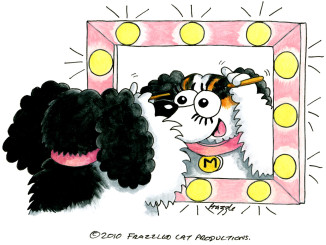
The Cavalier King Charles Spaniels eyes are one of the least sterile part of the body. Their eyelids do not always close properly, and therefore are prone to gathering dirt and grit on the surface. It is recommended to fill a jug with warm water from the tap, using a baby sponge, gently flood the eye also taking care to clean around the area after.
- Clean sponge with boiling water first! Sometimes if the eyes are a bit sore, 1ml of witch hazel is soothing. ‘Viscotears’ during the day and ‘Lacri-lube’ at night can also be used.
-
Paw Care
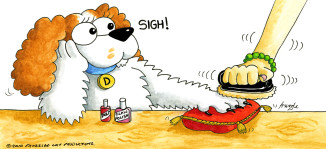
Removing chewing gum and other nasties:
Using a small dish or cotton wool, thoroughly soak the area with, sunflower oil (or any light oil) work the oil into the sticky or hard patch with your fingers. Blot off the excess oil with paper towel and was the area with dog shampoo, keep repeating until the nasty substance has gone.
- Ensure that the oil is dried off thoroughly before your dog trots off around the house. It is important feet and between the toes are checked for debris like small stones, grass seed etc. If unnoticed for any length of time these could become very dangerous.
-
Bathing
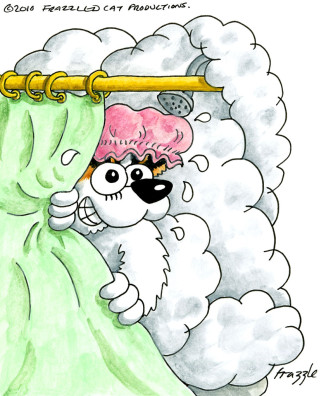
Daily thorough bushing and combing is recommended. Bathing should only be necessary 3-4 times per year unless of course you have a really mucky pup.
In between bathing a good waterless shampoo can be used which will help to promote healthy skin and shiny coat.
www.companyofanimals.co.uk
Ear Care
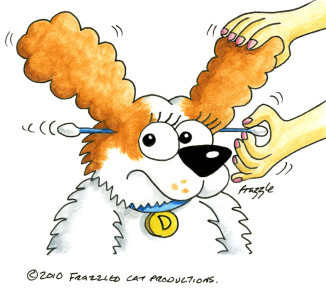
Cavaliers long ears make look really cute, however these floppy ears block ventilation leading to infection and a build-up of yeast. Keep the hair inside the flap and around the area clipped short, this will allow airflow which will stop the build-up of moisture. The key is to get as much air inside the ear as possible. Just doing this simple thing could prevent a lifetime of continual problems. CM/SM dogs have enough to contend with, so it is really important ear problems don’t develop.
Ears should be checked at least once a week. If they are very dirty and have too much wax, you must clean them. This should be done with a clean cotton cloth moistened with warm water. Never penetrate the ear canal with an object.
If you neglect cleaning the ears, there is a substantial risk of infection. A dog that is constantly scratching could be suffering from dirty ears or ear mites. If you find there is a frequent build-up of moisture, talk to your vet about a gentle solution that will prevent/reduce this from happening.
Thornit is also a great way of keeping the ears clean for dogs with CM/SM as putting a liquid cleaner like Cleanaural down the ear canal can be quite uncomfortable. Using Thornit can reduce the frequency in which ears need to be cleaned, therefore reducing cleaning time down to a minimum.
- If the ears are really bad, use something like ‘Thornit’ – just apply a little around the ear with a blusher brush, that way you do not put too much in.
-
Healthy Gums & Teeth = Healthy Heart
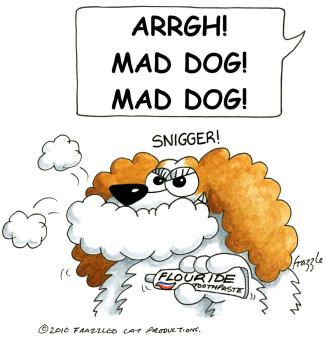
Tooth decay and diseased gums produce bacteria that get into your Cavalier’s bloodstream. It can result in problems to any of their organs but in particular, the heart valves where the bacteria starts to grow. The heart valves do not close completely and blood leaks past the valve. The normal sound of the heart valve closing, the two short sounds of lub-dub are replaced with a single long sound or a heart murmur. The blood pressure decreases since there is a leak in the heart valve and before long, congestion builds up in the lungs which marks the beginning of congestive heart failure.
Kidneys are also very vulnerable and this could be one of the major killers of older dogs. Don’t use human toothpaste but entice your Cavalier with the beef or chicken flavoured varieties because you need to keep your dog’s teeth clean for more reasons than ‘the dog-breath issue’
- Cavaliers are prone to heart disease – it is imperative to carry out good oral hygiene.
-
Brushing Teeth
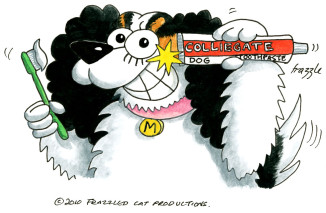
The most effective method to prevent tartar build up in our Cavaliers teeth is usually brushing them daily. Brushing breaks down the daily deposit of plaque before it hardens into tartar. To begin a brushing routine, use something tasty. Putting this on your finger such as a flavoured toothpaste and letting him lick it off. Offer him this flavour treat several times a day and then start rubbing his teeth with your flavoured finger. Hopefully he will begin to look forward to you taking care of his teeth. Next you can wrap a gauze square or wash cloth around your finger and use it like a toothbrush. Wipe all the teeth, front and back, with a back and forth movement. As an aid to brushing their teeth, keeping the mouth closed. By using one hand around the muzzle to keep the mouth closed and to steady their head, you can use the other hand to do the brushing.
Once he is used to you rubbing his teeth with your finger, you can start by using a “soft” toothbrush. If he puts up a fuss, try dipping the toothbrush in warm water and a tasty dog treat he likes. You will have a better response to the toothbrush. After he accepts the toothbrush, squeeze a small amount of special dog toothpaste onto the brush. Never use human toothpaste as it will irritate the dogs stomach and cause foaming at the mouth or vomiting. Begin by brushing the front teeth. Then brush the large upper and lower teeth in the back. The bristles should be held at a 45-degree angle to the tooth surface and be moved in an oval direction. Be sure to scrub in the crevice where the gums meet the teeth as this is where odour and infection begin. Brushing teeth daily is the best suggestion; you cannot overdo this important health care step.
Annual veterinary dental care and home dental care will help keep your dogs breath fresh and gums, teeth and heart healthy.
Your pet’s smile and healthier life will be equalled by your smile and pride in a job well done.
Too Fat to Function
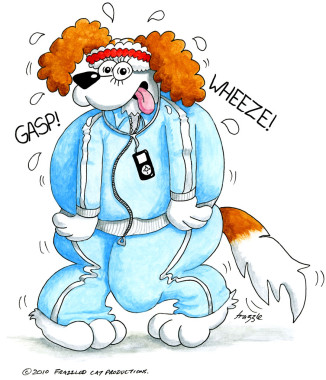
There is no such thing as killing with kindness when it comes to the Cavalier we chose to share our lives with, killing is killing. Abuse is abuse and animal cruelty comes in many forms regardless of its intent.
A fat Cavalier is a less healthy, less happy dog. A seriously fat Cavalier will undoubtedly die as a result of their weight. Owners need to take responsibility for the health of their Cavalier, regardless of how they lead their own lives.
A Cavalier usually gets too fat because of over feeding and lack of exercise. Medicines or disease are rarely the cause, Cavaliers have a tendency to quickly get fat a piece of information you should keep in mind.
Cavaliers that are too fat are often given too much food and too many treats between meals. Gluttony or boredom can also be a cause and a Cavalier can often put weight on after neutering, due to hormone levels changing the dog can become less active. Simply too little exercise alone can lead to the dog becoming overweight.
The following rule of thumb is normally used to check if your dog is overweight. You should be able to feel his ribs, but not see them. If you can’t feel his ribs then your dog is too fat.
So it is important to make sure your dog doesn’t get too fat. If your dog gets snacks/treat between meals, reduce his meal size. Try to make sure your dog gets plenty of exercise by playing and running with it as much as you can.
Liven Up Your Dogs Dinner
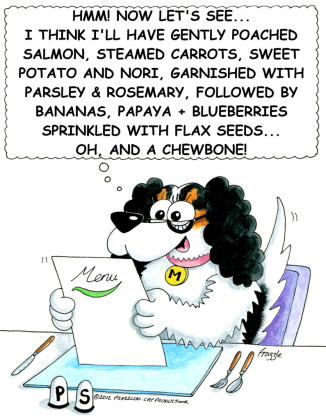
If you’re going to feed your dogs “people” food, shouldn’t you feed them something that’s actually good for them? Here are some healthy, easily obtainable options straight from market shelves that can be added to spice up your pup’s regular fare. There are, of course, a few cautions to keep in mind. First, none of these items by themselves constitutes a “complete and balanced” meal, and if your dog has health or weight issues, check with your vet before introducing them. Next, considering that many dogs are willing to eat almost anything they find, they can be surprisingly fussy about new things in their food bowls; start with a small portion to see if it’s a go… or no. And finally, always introduce new foods gradually.
Supplements
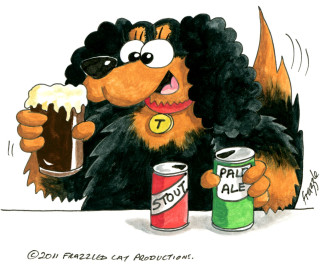
If you are considering supplementing, I’d recommend reading some of Monica Segals’ booklets/book, her newsletters and perhaps joining her forum. She and other nutritionists are adamant that over supplementing or mixing together lots of things without understanding what they do, how they work and ways they can conflict is as risky to a dog’s health as a nutritionally poor diet – and adding in things can actually deplete the natural food’s nutrition and deprive a dog of important nutrients!
This is particularly important in light of some recent studies that showed that, contrary to what many had expected, humans taking a range of supplements actually had shorter rather than longer lives on average.
Using very basic additions like a fish oil capsule, probiotics and CoQ10 is one thing careful research and great caution is needed before adding in handfuls of supplements that may over the long term damage rather than improve health.
www.monicasegal.com

